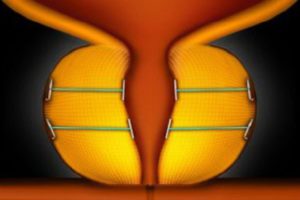
Teleflex received positive results for a multi-centre study reaffirming the safety and effectiveness of its minimally invasive UroLift system for the treatment of benign prostatic hyperplasia (BPH) in real-world patient populations. These were published in the Journal of Endourology.
The multi-centre, retrospective study examined the results of 1,413 consecutive patients who received the UroLift system for treatment of lower urinary tract symptoms due to BPH. The trial took place over the course of two years across 14 sites in North America and Australia. The study investigators set out to determine whether clinical outcomes are consistent with those found in controlled studies, and found that they were.
Data published from the study show that patients from multiple subgroups treated with the UroLift system experienced improvements in International Prostate Symptom Score (IPSS) and Quality of Life (QoL) score:
- Consistent with the previous LIFT study, symptoms improved significantly from baseline at all follow up time points through two years, and most perioperative adverse events were mild to moderate, resolving by four weeks.
- In a cohort-matched comparison to LIFT study patients with moderate–severe symptoms (IPSS≥13), symptom improvement was similar at all time points.
- Of the 165 patients in retention at baseline, 83% became catheter-free by one-month post-procedure, and 87% were catheter-free by the end of the study; IPSS scores were similar to non-retention patients.
- In the 73 patients with prior prostate cancer treatment, mean IPSS improved at all time points with no significant difference in adverse events of interest compared to other patients.
- IPSS improvement was similar regardless of prostate volume (<30cc; 30cc to <80cc; ≥80cc)
“Not only are the real-world results from this large, multi-centre study consistent with the LIFT study, this study also provides data in populations of patients who were not studied in the LIFT study but are seen in a real-world clinic setting,” says Gregg Eure, urologist at Urology of Virginia (Virginia Beach, USA), a lead investigator and co-author of the study. “These findings should give urologists and patients the confidence to adopt the UroLift system within the broader BPH population.”
The randomised LIFT clinical trial demonstrated that treatment with the UroLift system provides patients rapid and durable symptom relief. The procedure demonstrates an excellent safety profile and preserves sexual function.
UroLift is a minimally invasive technology cleared by the US Food and Drug Administration (FDA) for treating lower urinary tract symptoms due to BPH. The UroLift permanent implants, delivered during a minimally invasive transurethral outpatient procedure, relieve prostate obstruction and open the urethra directly without cutting, heating, or removing prostate tissue.
Teleflex acquired NeoTract, the privately-held medical device company that developed and commercialised the UroLift system, in Autumn 2017 in a transaction valued at up to US$1.1 billion.












